Taipei, Feb 5: Rescuers were searching for 12 people on Thursday morning after using a crane to hoist the fuselage of a wrecked TransAsia Airways plane from a shallow river in Taiwan's capital following a crash that killed at least 31 others.
Flight 235 with 58 people aboard - many of them travelers from China - banked sharply on its side Wednesday shortly after takeoff from Taipei, clipped a highway bridge and then careened into the Keelung River.
Rescuers in rubber rafts pulled 15 people alive from the wreckage during daylight. After dark, they brought in the crane, and the death toll was expected to rise once crews were able to search through submerged portions of the fuselage, which came to rest a few dozen meters (yards) from the shore.
Dramatic video clips apparently taken from cars were posted online and aired by broadcasters, showing the ATR 72 propjet as it pivoted onto its side while zooming toward a traffic bridge over the river. In one of them, the plane rapidly fills the frame as its now-vertical wing scrapes over the road, hitting a vehicle before heading into the river.
Speculation cited in local media said the crew may have turned sharply to follow the line of the river to avoid crashing into a high-rise residential area, but Taiwan's aviation authority said it had no evidence of that.
Taiwanese broadcasters repeatedly played a recording of the plane's final contact with the control tower in which the crew called out "Mayday" three times. The recording offered no direct clues as to why the plane was in distress.
It was the airline's second French-Italian-built ATR 72 to crash in the past year. Wednesday's flight had taken off at 11:53am. from Taipei's downtown Sungshan Airport en route to the outlying Taiwanese-controlled Kinmen islands. The crew issued the mayday call shortly after takeoff, Taiwanese civil aviation authorities said.
TransAsia director Peter Chen said contact with the plane was lost four minutes after takeoff. He said weather conditions were suitable for flying and the cause of the accident was unknown.
"Actually this aircraft in the accident was the newest model. It hadn't been used for even a year," he told a news conference.
Thirty-one passengers were from China, Taiwan's tourism bureau said. Kinmen's airport is a common link between Taipei and China's Fujian province.
Taiwan's Civil Aeronautics Administration said 31 people were confirmed dead, 15 were rescued with injuries and 12 were still missing. It said two people on the ground were hurt.
Part of the freeway above the river where the plane crashed was littered with debris and was closed after the accident.
Relatives of the victims had not reached the scene by dusk Wednesday but some were expected to arrive Thursday, including some flying from Beijing. The plane's wing hit a taxi on the freeway, and the driver and a passenger were injured, Chen said.
Taiwan's Ministry of National Defense said it had sent 165 people and eight boats to the riverside rescue scene, joining fire department rescue crews.
Another ATR 72 operated by the same Taipei-based airline crashed in the outlying Taiwan-controlled islands of Penghu last July 23, killing 48 at the end of a typhoon for reasons that are still under investigation.
ATR, a French-Italian consortium based in Toulouse, France, said it was sending a team to Taiwan to help in the investigation.
The ATR 72-600 that crashed Wednesday is manufacturer's best plane model, and the pilot had 4,900 hours of flying experience, said Lin Chih-ming of the Civil Aeronautics Administration.
Greg Waldron, Asia managing editor at Flightglobal magazine in Singapore, said the ATR 72-600 is the latest iteration of one of the most popular turboprop planes in the world, particularly favored for regional short-hop flights in Asia.
It has a generally good reputation for safety and reliability and is known among airlines for being cheap and efficient to operate.
While it's too early to say what caused the crash, engine trouble or weight shifting were unlikely to be causes, Waldron said. Other possible factors include pilot error, weather or freak incidents such as bird strikes.
"It's too early now to speculate on whether it was an issue with the aircraft or crew," Waldron said.
The accessibility of the crash site should allow for a swift investigation, and an initial report should be available within about a month, Waldron said.
At least 16 killed when TransAsia plane crashes into Taiwan river
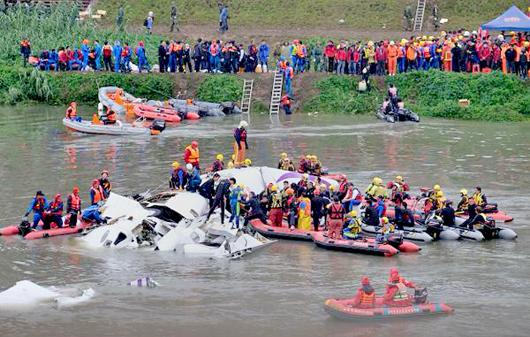
Taipei, Feb 4: A plane carrying mostly Chinese tourists has crashed into a river in Taiwan, killing at least 16 people.
Dramatic video footage emerged showing the TransAsia Airways plane clipping a bridge as it came down shortly after take-off from a Taipei airport.
The plane, carrying 58 people, has broken up and the fuselage is lying half-submerged in the Keelung River. Rescue efforts are ongoing.
Another TransAsia plane crashed in bad weather last July, killing 48 people.
Cindy Sui reports: ''Many of the people on board are still inside the aircraft''
Rescuers on boats have cut the plane open to gain access to several people still trapped inside.
The ATR-72 turbo-prop plane had just taken off from Taipei Songshan Airport and was heading to the Kinmen islands, just off the coast of the south-eastern Chinese city of Xiamen.
Taiwan's Civil Aeronautics Administration said the last communication from one of the pilots had been: "Mayday, mayday, mayday."
Flight controllers lost contact with the plane at 10:55 local time (02:55 GMT).
Footage of the plane filmed from inside passing cars showed it banking sharply, hitting a taxi and clipping the bridge before crashing into the river.
"I saw a taxi, probably just metres ahead of me, being hit by one wing of the plane," an eyewitness told local media.
"The plane was huge and really close to me. I'm still trembling."
Reports on the number of dead varied, with some saying at least 16 people lost their lives. Several people suffered injuries and some were still unaccounted for.
TV footage showed rescuers standing on large sections of broken wreckage trying to pull passengers out of the plane with ropes.
Those that were rescued were helped into dinghies and taken to shore.
Some were then placed on stretchers and taken to hospital.
But officials said some passengers were still trapped inside the wreckage, which appeared to be upside down.
"We're asking the public works department for heavy cranes to be deployed in the hope that the body of the plane can be lifted up," said Wu Jun-Hong, assistant director of Taipei's fire department.
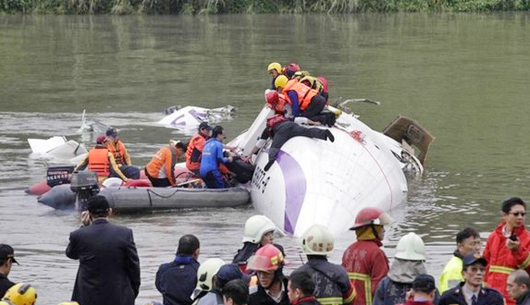
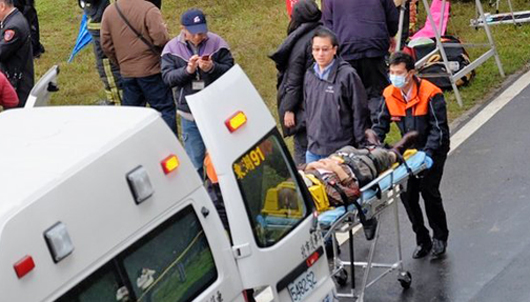
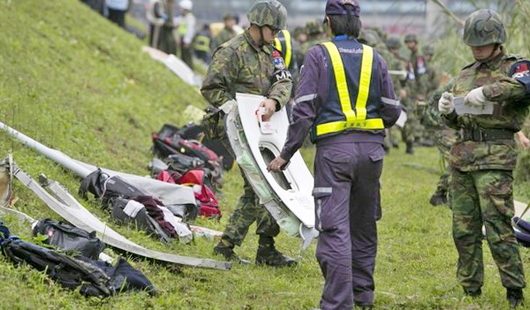
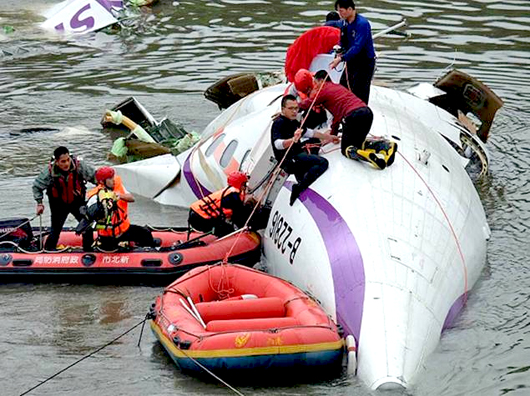
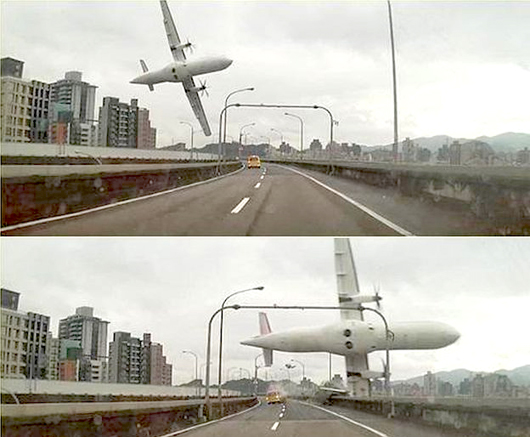
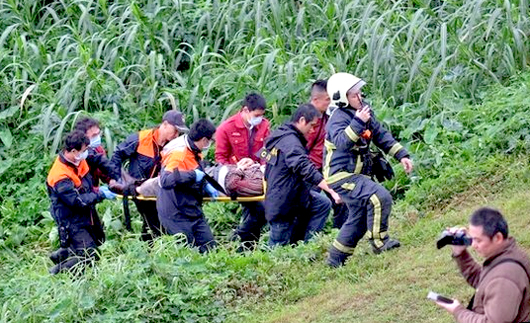




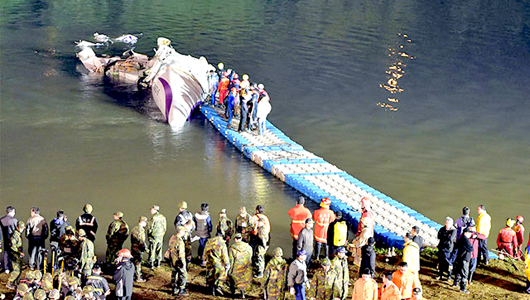
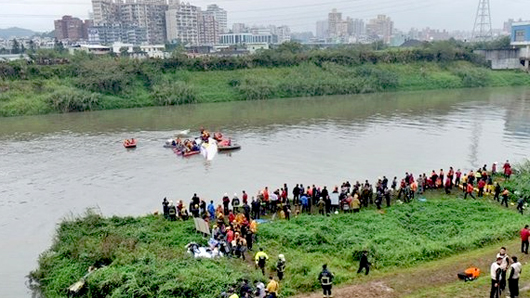

Comments
Add new comment